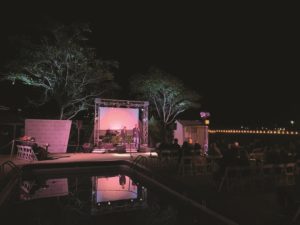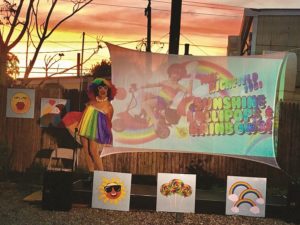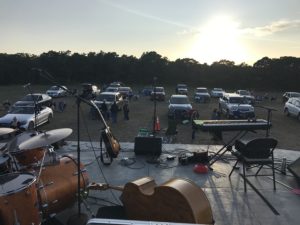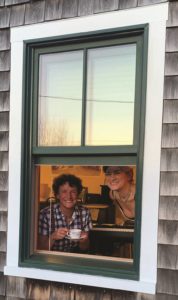The summer came and went. And against all odds, we had live music, cabaret, and drag. Performers and venues acclimated to an entirely new way of performing — outdoors and socially distanced.

Now, as we enter the off season, what will happen to them? Pilgrim House and the Crown & Anchor continue to put on shows, but as the weather gets colder and the nights longer, performers will be forced into hibernation. Indoor performances are still not allowed, so the virtual realm may be the only way to go.
“There are a lot of entertainers who make their entire yearly living in one summer season,” says Jonathan Hawkins. “That is already super risky, but in normal seasons that tends to work out well for them. However, this season is very different, which is why we started the Provincetown Performing Arts Fund.”
The fund, begun by Hawkins and Jon Richardson, will provide relief to Provincetown performers, who may apply for up to $1,000 each calendar year. So far, Hawkins and Richardson have raised $27,000, mostly through benefit concerts at the Crown & Anchor and private events.

“We knew that getting through the summer was going to be tough,” says Hawkins. “But a real concern — and the reason we made applications due in September — is helping these artists get through the winter.”
Looking back on the Covid rules experience, Hawkins and Richardson say it completely transformed their relationship to their craft.
“The physical space between audience members, from the performer to the first row, creates an entirely different way of doing things,” says Richardson. “Audience members don’t know if they can laugh. The audience in the ‘old world’ used to be close to each other, and they felt an electricity. If someone laughed behind you, you laughed. If someone cried next to you, you cried.” Richardson says that at the Crown & Anchor, because of the social distance, “you had to learn to feed off the audience in a different way.”
“It encouraged entertainers to rethink how they entertain and why they entertain,” says Hawkins. “So many of us have gotten used to the affirmation that you usually receive. That energy is still there, it’s just different. As an artist, rather than hearing thunderous applause at the end and thinking, OK, I did something right, you now have to think, I am doing this because I love what I do. I have to trust myself. If I am exuding that passion, people are going to love it, too.”
Hawkins says that it took audiences a while to adjust to sitting in a group of people. “People would message us afterwards, saying, ‘I am overwhelmed with emotion, because that is first live thing I have seen since March.’ It was our responsibility to guide them through the first time that they might have been in a large public space.”

Russ King, whose drag persona is Miss Richfield 1981, also faced some challenges performing outdoors at Pilgrim House. “The strangest thing is that where I was — which is different from the Crown — we just couldn’t see the audience,” King says. “People were sitting so far away from one another, it was hard sometimes to get them to respond. Seating is really integral for comedy. For live performance, it’s contagious to have people together.”
Contagion, it seems, is both the problem and the key, and hard to build when the cap is 50 people, including performers and staff. “The nice thing is, the weather didn’t present nearly the challenge that it could have,” King says. “That was a godsend.”
Despite it all, King says he is really grateful he got to perform live. “I don’t have to worry as much. I have a safety net,” he says.
Zoë Lewis says that, performing at the Payomet Drive-in, “I realized how much I missed playing for people. It was thrilling. I’ve never played a drive-in before — essentially, to a bunch of cars. And instead of clapping, people hooted their horns. I felt like a rock star.”

Lewis also has a virtual act — Zoë Lewis and the Social Distancers — that featured special guests singing or playing to her outside her window, a metaphor for all performance right now. She says of wearing masks, “It makes you realize the importance of a smile. We have to read each other’s eyes now.”
Suede, normally a Cape perennial, will play the Crown & Anchor on Oct. 11, her first local performance this year. Her summer season was almost entirely canceled. She says that it is unfortunate that indoor venues are “the last ones allowed to reopen. What is tough is that the place we go to refuel is getting onstage with an audience.”
Whether it is waiting in line at the box office, or even holding a program, what we used to take for granted in live performance is no more. “Everything has been stripped away,” says Hawkins. “How do we still do what we do?”



